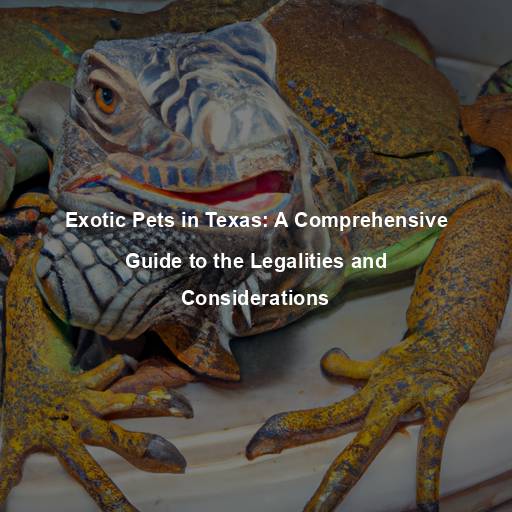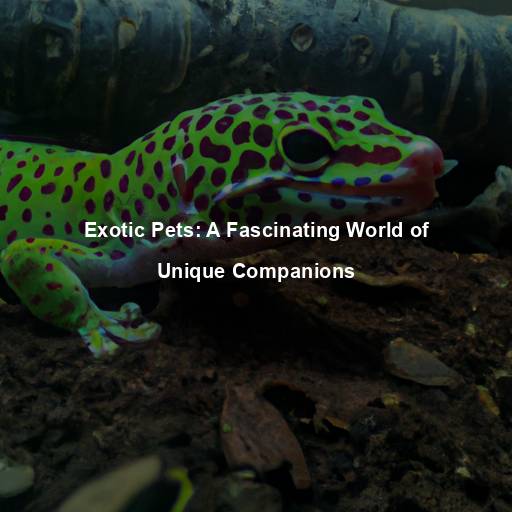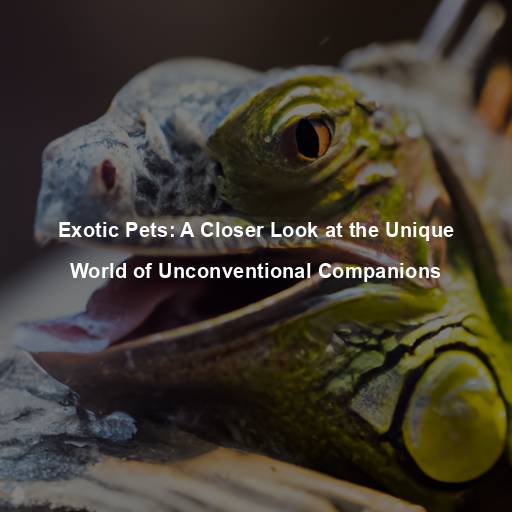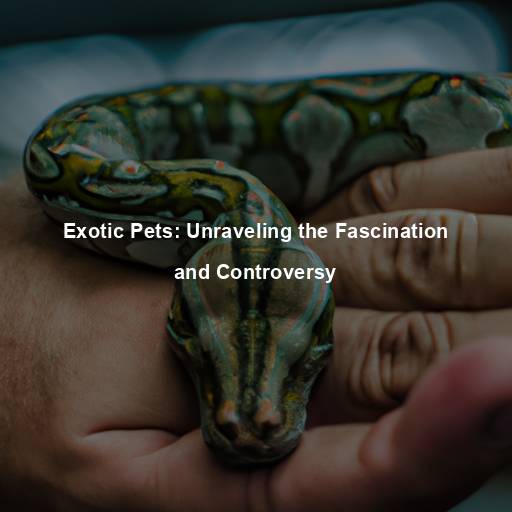Exotic Pets in Texas: A Comprehensive Guide to the Legalities and Considerations
Last Updated on November 19, 2023 by Evan
Contents [hide]
- 1 Understanding the Fascination with Exotic Pets
- 1.1 The Legal Landscape of Exotic Pet Ownership in Texas
- 1.2 The Exotic Pet Permitting Process
- 1.3 Ethical Considerations and Potential Challenges
- 1.4 Responsible Pet Ownership and Exotic Pets
- 1.5 Considering Alternative Ways to Experience Exotic Animals
- 1.6 Knowledgeable and Reputable Breeders
- 1.7 Proper Nutrition and Diet
- 1.8 Enriched Environment
- 1.9 Veterinary Care and Regular Check-ups
- 1.10 Socialization and Mental Stimulation
- 1.11 Responsible Breeding Practices
- 1.12 Continual Education and Learning
- 2 FAQs – Exotic Pets Legal in Texas
- 2.1 What is considered an exotic pet in Texas?
- 2.2 Are there any restrictions on owning exotic pets in Texas?
- 2.3 Do I need a permit to own an exotic pet in Texas?
- 2.4 Can I legally own a venomous snake as an exotic pet in Texas?
- 2.5 Are there any endangered or protected species that I cannot own as an exotic pet in Texas?
- 2.6 Are there any size restrictions on exotic pets in Texas?
- 2.7 Do I need liability insurance to own an exotic pet in Texas?
- 2.8 Can I sell or trade exotic pets in Texas?
- 2.9 Can I bring my exotic pet from another state to Texas?
Understanding the Fascination with Exotic Pets
The allure of exotic pets has long fascinated animal lovers, enticing them with the breathtaking beauty of a Bengal tiger or the mischievous charm of a capuchin monkey. However, the journey of owning such unique companions is not without its perplexities and legal intricacies. In this exclusive guide, we invite you to unravel the enigmatic world of exotic pets in Texas, exploring the multifaceted realm of laws, requirements, and ethical dilemmas associated with their ownership. Prepare to be captivated by a wealth of knowledge and discover the hidden secrets that lie within this extraordinary domain.
The Legal Landscape of Exotic Pet Ownership in Texas
Texas, known for its vast landscapes and independent spirit, has a unique set of regulations governing the ownership of exotic pets. The state recognizes the desire of its residents to own these extraordinary creatures but also prioritizes public safety and animal welfare. The Texas Parks and Wildlife Department (TPWD) plays a crucial role in regulating exotic pet ownership, overseeing the permits and licenses required for specific species.
The Texas Parks and Wildlife Department (TPWD) and Its Role
The TPWD is responsible for implementing and enforcing regulations related to exotic pet ownership in Texas. Their primary objective is to strike a balance between protecting the public and ensuring the welfare of the animals. TPWD issues permits for the possession, breeding, and sale of exotic animals, while also monitoring compliance with specific regulations.
The Exotic Pet Permitting Process
Understanding the Permit Classifications
Texas has established a meticulous classification system for exotic pets, segregating them into two distinct categories: those identified as dangerous wild animals and those deemed non-dangerous exotic animals. With unique requirements and regulations allotted to each group, the state leaves no room for ambiguity when it comes to the ownership and care of these captivating creatures. It’s a comprehensive approach that aims to bridge the gap between preserving nature’s extraordinary diversity and ensuring public safety in the Lone Star State.
Dangerous Wild Animals
Animals classified as dangerous wild animals pose a potential threat to public safety due to their size, strength, or aggressive nature. Species such as lions, tigers, bears, and certain primates fall under this category. Owning a dangerous wild animal in Texas requires a specific permit obtained from the TPWD.
Non-Dangerous Exotic Animals
The world of non-dangerous exotic animals is a colorful tapestry, encompassing a diverse array of fascinating creatures. From non-native reptiles with their intricate scales to the captivating songs of exotic birds, this realm offers a mesmerizing journey into the wild. While these animals may not pose a significant threat to public safety, it is essential to bear in mind that specific guidelines and limitations may still come into play, varying on a species-by-species basis. Explore this enigmatic realm with caution and an adventurous spirit, for the wonders it holds will surely leave you enthralled.
Obtaining an Exotic Pet Permit
To legally own an exotic pet in Texas, individuals must obtain the appropriate permits from the TPWD. The process involves several steps, including:
It is imperative to delve into the intricacies of each species and their individual permit requirements. This research is essential to ensure compliance with the complex regulations governing these creatures. Taking the time to fully grasp these requirements is paramount before embarking on any further steps.
- Analyzing the environmental impact of introducing the species into a new ecosystem: Introducing a new species can have significant ecological consequences, and it is important to assess and understand the potential impact before making any decisions.
- Filling out the permit application: The TPWD provides application forms that must be completed accurately and submitted along with any necessary supporting documentation.
When it comes to permit applications, a crucial element to keep in mind is the payment of processing fees. These fees, which can differ based on the species and permit type, are an important aspect of the application process. Understanding the intricacies of these fees is necessary to ensure a smooth and successful permit application.
At TPWD, we take the welfare of animals and the condition of facilities seriously, which is why we conduct regular inspections to ensure everything is up to standard. These inspections allow us to evaluate the suitability of the facilities and make any necessary improvements to ensure the well-being of the animals under our care. Rest assured, we are committed to maintaining a high standard of quality and ensuring a safe and comfortable environment for all.
Securing the seal of approval and the coveted permit from the Texas Parks and Wildlife Department (TPWD) comes as the ultimate triumph for aspiring exotic pet owners. With a meticulous checklist of requirements successfully ticked off, the pathway to legal ownership opens up, enthralling the audacious few who dare to delve into the realm of the extraordinary. Brace yourself for a flurry of excitement and suspense as the TPWD ceremoniously bestows the long-awaited permit, granting unprecedented access to the captivating world of exotic creatures. Prepare to be captivated, bewildered, and in awe as the dream becomes tangibly real.
Responsibilities of Exotic Pet Owners
Caring for an exotic pet is no light task. It demands immense responsibility, demanding that owners provide resolute care, unwavering attention, and a meticulously curated habitat to ensure the creature’s holistic welfare. Moreover, adhering to a labyrinthine web of regulations becomes imperative for those venturing into the realm of exotic pets, navigating a tangle of dos and don’ts that can leave even the most seasoned enthusiasts feeling confounded.
As pet owners, it is our paramount responsibility to prioritize the well-being of our fur babies. This entails diligently attending to their needs, encompassing proper nourishment, comfortable living conditions, and regular medical attention from qualified veterinarians. By conscientiously fulfilling these obligations, we can guarantee that our beloved animal companions enjoy optimal health and overall contentment.
– Preventing escape or unauthorized access to the animal.
Navigating the intricate web of regulations surrounding the transportation, public exhibition, and sale of exotic pets can be a perplexing endeavor. From understanding the ever-changing laws to ensuring compliance with various guidelines, the process can leave even the most experienced individuals feeling overwhelmed. However, staying informed and adhering to these regulations is vital to ensure the well-being and ethical treatment of these unique creatures.
– Maintaining accurate records and reporting any significant changes in ownership or animal status to the TPWD.
Ethical Considerations and Potential Challenges
While the allure of owning an exotic pet may be strong, it is crucial to consider the ethical implications and potential challenges associated with their ownership. Exotic animals have unique needs and require specialized care that may be difficult to meet in a domestic setting.
Conservation and Environmental Impact
It’s a bewildering reality that numerous extraordinary creatures are teetering on the edge of extinction or facing alarming threats within their own habitats. One cannot deny that the desire to keep these creatures as pets indirectly feeds into the nefarious world of illegal wildlife trade, thereby exacerbating their already perilous situation. In an era defined by ethical dilemmas, it is vital to refocus our priorities by emphasizing the urgent need for conservation measures and dissuading any form of support for such unethical practices.
Expertise and Resources
Properly caring for an exotic pet requires a significant commitment of time, resources, and expertise. These animals often have specific dietary and environmental needs that may be challenging to meet without specialized knowledge. It is essential to thoroughly research and educate oneself before bringing an exotic pet into the home.
Longevity and Lifespan
When it comes to pets, some choose to embark on a more extraordinary path, welcoming exotic companions into their lives. These unique creatures, boasting lifespans far beyond the norm, require an extraordinary level of dedication and fortitude from their human custodians. For those brave enough to take up the mantle, the rewards can be remarkably fulfilling, albeit with perplexing challenges that may span generations.
Socialization and Behavioral Needs
As we delve into the fascinating world of exotic animals, we uncover their captivating social and behavioral intricacies. These extraordinary creatures, with their unique needs, thrive on extensive social interaction and mental stimulation, which can pose perplexing challenges in a domestic setting. Neglecting these essential requirements may result in a cascade of behavioral issues, ultimately compromising the animal’s overall well-being and quality of life.
Responsible Pet Ownership and Exotic Pets
Owning an exotic pet requires a higher level of responsibility compared to traditional pets. It is important to consider the following factors before bringing an exotic animal into your home:
Research and Education
Embarking on the enchanting journey of owning an exotic pet requires a plunge into a sea of knowledge and understanding. Dive deep into the realm of these extraordinary creatures to unravel their unique needs and whims. Immerse yourself in a whirlpool of research, exploring their behavior intricacies, dietary desires, the depths of their socialization requirements, and the twists and turns of potential health pitfalls. Seek wisdom from the wise gurus of the animal kingdom such as veterinarians, animal behaviorists, and seasoned exotic pet enthusiasts.
Adequate Living Space
Discover the enchanting realm of exotic pets and delve into the captivating world of their specialized enclosures. Immerse yourself in a labyrinth of living spaces that artfully mimic their natural habitats, indulging the creatures’ innate desires. Venture boldly into the realm of their physical and mental well-being, where spatial awareness intertwines with the necessary resources to create an idyllic utopia.
Veterinary Care
Finding a veterinarian with experience in treating exotic animals is crucial. Regular check-ups, vaccinations, and preventive care are essential to maintain the health of your exotic pet. Be prepared for potential higher veterinary costs compared to traditional pets.
Enrichment and Mental Stimulation
Exotic animals, like their wild counterparts, require mental stimulation and enrichment to prevent boredom and behavioral problems. Provide toys, puzzles, and activities that cater to their species-specific needs. Engage in interactive play and create a stimulating environment to keep them mentally and physically active.
Legal Compliance
Ensure that you are aware of and comply with all local, state, and federal laws regarding exotic pet ownership. Failure to do so may result in legal consequences and potential harm to the animal.
Considering Alternative Ways to Experience Exotic Animals
Thinking about bringing an exotic pet into your life? It’s a tempting notion, but let’s face it, it might not be the best fit for everyone. Don’t fret though, because there are plenty of other ways to get up close and personal with these magnificent creatures. Instead of taking on the responsibility of ownership, why not visit a zoo, wildlife sanctuary, or educational facility?
Knowledgeable and Reputable Breeders
Finding the perfect exotic pet often takes a leap into the world of knowledge and trust. Delving into the perplexing realm of breeders, one must navigate a maze of reputations and standards. A well-regarded and learned breeder serves as a gatekeeper to the enchanting realm of exotic pets, safeguarding the health and well-being of these unique creatures through responsible practices. With proper documentation and a wealth of guidance, these breeders bestow upon us the keys to nurturing and caring for these extraordinary companions.
Proper Nutrition and Diet
Exotic pets often have specific dietary requirements that must be met to maintain their health. Research the dietary needs of your chosen species and provide a well-balanced, species-appropriate diet. Consult with a veterinarian or an experienced exotic animal nutritionist to ensure your pet is receiving the proper nutrition.
Enriched Environment
Creating an enriched environment is essential for the well-being of exotic pets. Provide a spacious and stimulating enclosure that allows for natural behaviors and exploration. Include hiding spots, climbing structures, and environmental enrichment devices to keep your pet mentally stimulated and engaged.
Veterinary Care and Regular Check-ups
Regular veterinary care is crucial for exotic pets to monitor their health and detect any potential issues early on. Find a veterinarian experienced in treating exotic animals and schedule regular check-ups. This will help ensure that your pet receives necessary vaccinations, parasite control, and overall health assessments.
Socialization and Mental Stimulation
When it comes to exotic pets, it’s crucial to remember that socialization and mental stimulation are just as significant as with any other animal companion. Each species may have specific demands, whether it’s creating opportunities for socializing with their own kind or engaging in activities tailored to their unique needs. One way to provide mental stimulation and foster a stronger bond is through enrichment activities like puzzle toys and training sessions. So, if you’re considering an exotic pet, be prepared to embrace the challenge of keeping them entertained and fulfilled.
Responsible Breeding Practices
When it comes to breeding unique and fascinating pets, responsible practices should be at the forefront of your mind. It’s essential to prioritize the well-being and preservation of the species, rather than simply seeking financial gain or fleeting trends. A responsible breeder, committed to genetic diversity and steering clear of inbreeding, carefully selects suitable homes for their offspring, ensuring their future is bright. Get ready to embark on this perplexing and awe-inspiring journey of responsible exotic pet breeding!
Continual Education and Learning
As a passionate enthusiast of unique companions, it is crucial to maintain an ever-evolving understanding of the mesmerizing creatures you have chosen to welcome into your life. Unravel the secrets of their enigmatic world, constantly immerse yourself in the latest findings, nurturing methodologies, and ethical reflections. Let your curiosity guide you towards enlightening seminars, captivating workshops, and awe-inspiring conferences that revolve around the art of nurturing exotic pets. There, you will unlock the gateway to an elevated understanding, enabling you to lavish your extraordinary companions with the absolute pinnacle of care.
FAQs – Exotic Pets Legal in Texas
What is considered an exotic pet in Texas?
Step into the wild side of Texas, where the definition of an exotic pet takes a curious twist. Prepare to be astonished as we delve into the realm of creatures that defy the ordinary. From majestic non-native big cats with their awe-inspiring presence, to the enigmatic world of primates swinging through the branches, and the slithering allure of large snakes, the Lone Star State is a tapestry of exotic wonders. Brace yourself for a menagerie of unexpected companions, including the most captivating bird species and an array of exotic mammals. Embark on a journey that blends fascination with perplexity as we unravel the captivating world of unconventional companions in the Lone Star State.
Are there any restrictions on owning exotic pets in Texas?
Yes, there are certain restrictions and regulations in place for owning exotic pets in Texas. While some animals require specific permits or licenses, others may be completely prohibited. It is crucial to research and understand the specific rules for each species, as these restrictions can vary depending on the animal.
Do I need a permit to own an exotic pet in Texas?
The need for a permit depends on the specific type of exotic pet you wish to own in Texas. Animals such as big cats, primates, and dangerous reptiles generally require a permit or license from the Texas Parks and Wildlife Department (TPWD) or other relevant authorities. It is important to consult the appropriate agencies to determine if a permit is required for the species you are interested in.
Can I legally own a venomous snake as an exotic pet in Texas?
Owning venomous snakes as exotic pets in Texas can be quite the legal maze, with the necessary permits acting as elusive keys. The Texas Parks and Wildlife Department (TPWD) holds the power to grant or deny the ownership of these perilous reptiles, laying down intricate guidelines for housing, care, and safety precautions that can leave even seasoned snake enthusiasts feeling perplexed. So, before slithering down the path of venomous snake ownership, make sure you tread carefully and obtain the proper permits to navigate this legal serpentinescape in the Lone Star State.
Are there any endangered or protected species that I cannot own as an exotic pet in Texas?
Yes, it is illegal to own any endangered or protected species as an exotic pet in Texas without the appropriate permits. It is essential to check the Endangered Species Act and consult with TPWD or the U.S. Fish and Wildlife Service to ensure compliance with regulations and laws regarding protected species.
Are there any size restrictions on exotic pets in Texas?
When it comes to owning exotic pets, size does matter, but not in the way you might think. While there aren’t any set rules on how small or big your furry (or scaly) friend can be, it’s crucial to take into account their need for ample space and whether they’re a good fit for a home setting. For instance, majestic creatures such as big cats or primates require extra attention, as there are often specific guidelines and regulations in place to ensure their well-being in terms of enclosure and housing facilities. So, before embarking on an exotic animal adventure, be sure to do your research and consider all the perplexing factors that come into play for the sake of both you and your potential pet.
Do I need liability insurance to own an exotic pet in Texas?
Liability insurance is not explicitly required to own an exotic pet in Texas. However, it is highly recommended to carry liability coverage due to the potential risks associated with owning such animals. Insurance can protect you financially in case of any accidents, damage, or injuries involving your exotic pet.
Can I sell or trade exotic pets in Texas?
Sourcing or exchanging extraordinary companion animals within the state of Texas can be a complex maze of regulations and requirements, subject to elusive restrictions dependent on the particular species in question. Should one choose to embark on this journey, grappling with permits and bureaucratic hoops might become a necessary rite of passage. Ensuring thorough research and diligent adherence to the multifaceted tapestry of regulations governing the buying, selling, or trading of unorthodox pets is imperative to circumvent potential entanglements with the long arm of the law.
Can I bring my exotic pet from another state to Texas?
Bringing exotic pets from another state to Texas may be permissible, but it is crucial to adhere to the regulations governing the transportation and ownership of the specific species. Certain animals may require health certificates, permits, or other documentation to ensure compliance with Texas laws. Acquiring the necessary permits and consulting with the TPWD or relevant agencies is recommended before bringing an exotic pet into the state.







